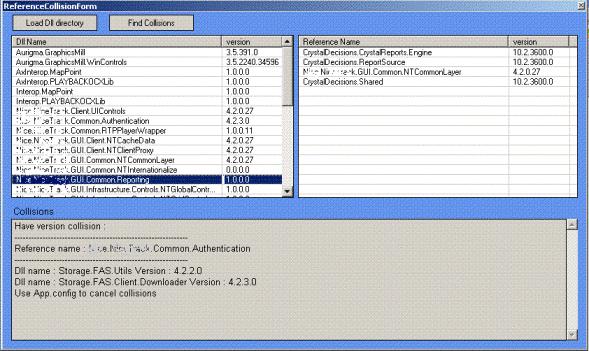
Introduction
The Collision Finder application is intended to help a development team to find colliding references to external DLLs.
Background
During the development of our system, we encountered a problem regarding referencing different versions of external DLLs. The problem gets worse when there is second stage reference from an external DLL to another one, which has a wrong version.
In order to solve this problem, I developed an application that helps the development team to find collisions during integration (rather than at run time).
Using the code
There are three projects:
- Console application: Returns a value of 1 if there is any collision, and 0 otherwise. The colliding DLLs will be printed out to the console.
- Windows application: This application helps the developer to analyze the external references by showing all the relations between the DLLs that are being used in a specific folder.
- Class library: The code beneath….
Find: This method uses an input parameter of string type that represents the path to the folder to analyze, and returns true/false according to the existence of a collision.
CollisionOutPut: get property, returns a string with all the collisions that were found.
Data: returns a dataset of the analyzed data.
How to execute from a console application:
FindCollisions c = new FindCollisions();
bool reply = c.Find(args[0]); Console.Write(c.CollisionsOutPut);
if (reply == false)
return 1;
else
return 0;
How to find all the references of the current DLL:
ReferenceCollisionDataSet.DllTableRow dllRow =
_ds.DllTable.NewDllTableRow();
Assembly asm = Assembly.LoadFile(file);
AssemblyName asmName = asm.GetName();
dllRow.Name = asmName.Name;
dllRow.Version = asmName.Version.ToString();
_ds.DllTable.Rows.Add(dllRow);
foreach (AssemblyName refName in asm.GetReferencedAssemblies())
{
try {
if (IsNotSystemRef(refName))
{
ReferenceCollisionDataSet.ReferenceTableRow refRow =
_ds.ReferenceTable.NewReferenceTableRow();
refRow.Dll_Name = asmName.Name;
refRow.Reference_Name = refName.Name;
refRow.Version = refName.Version.ToString();
_ds.ReferenceTable.Rows.Add(refRow);
}
catch { }
}
This member has not yet provided a Biography. Assume it's interesting and varied, and probably something to do with programming.
 General
General  News
News  Suggestion
Suggestion  Question
Question  Bug
Bug  Answer
Answer  Joke
Joke  Praise
Praise  Rant
Rant  Admin
Admin 







